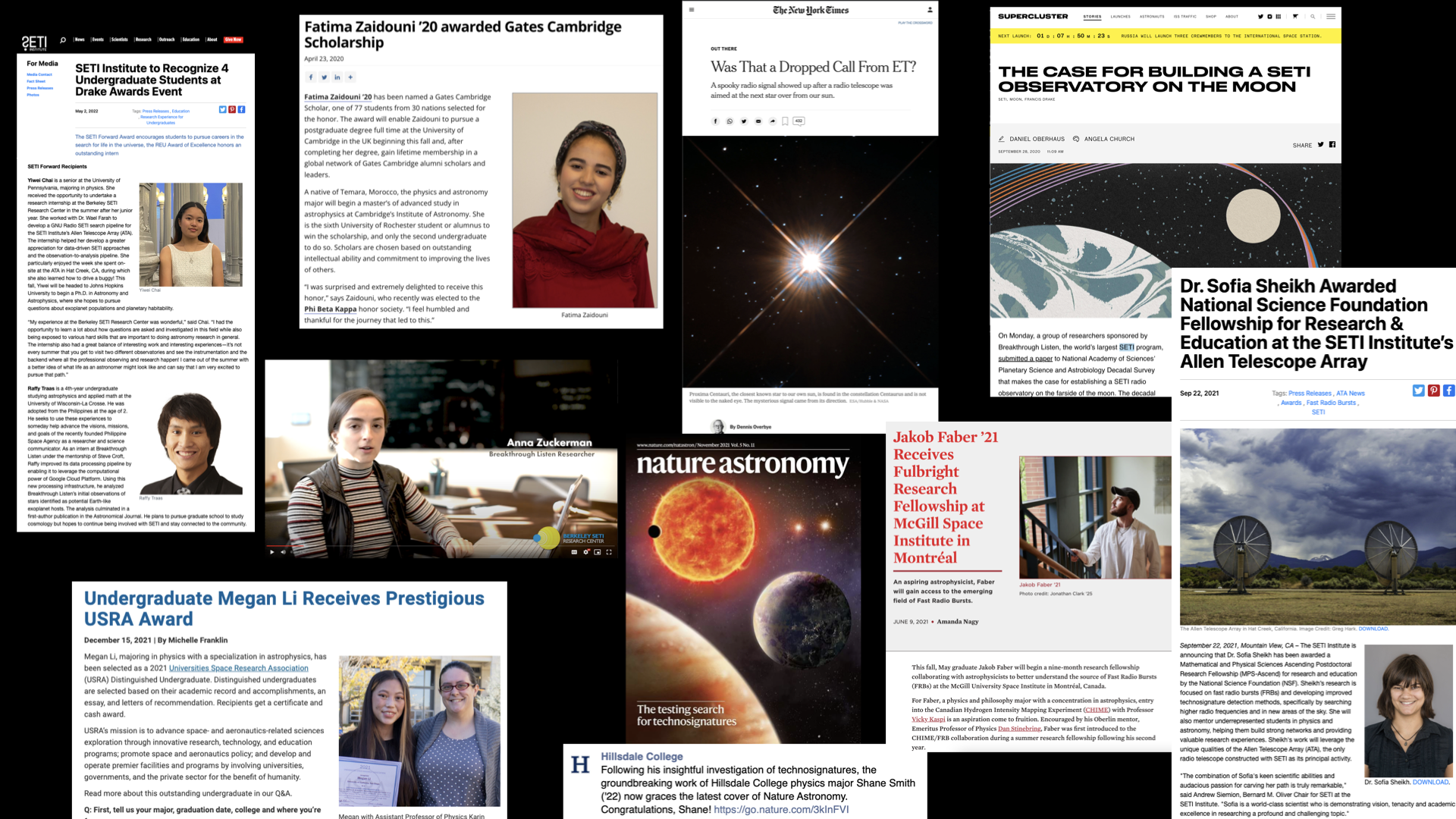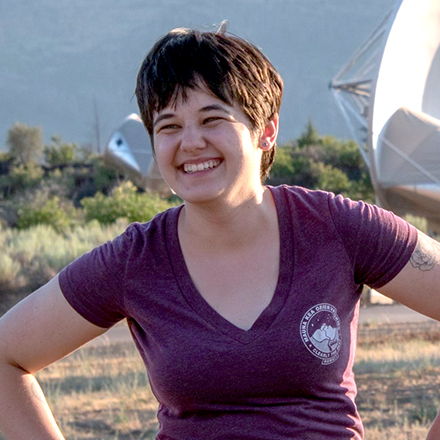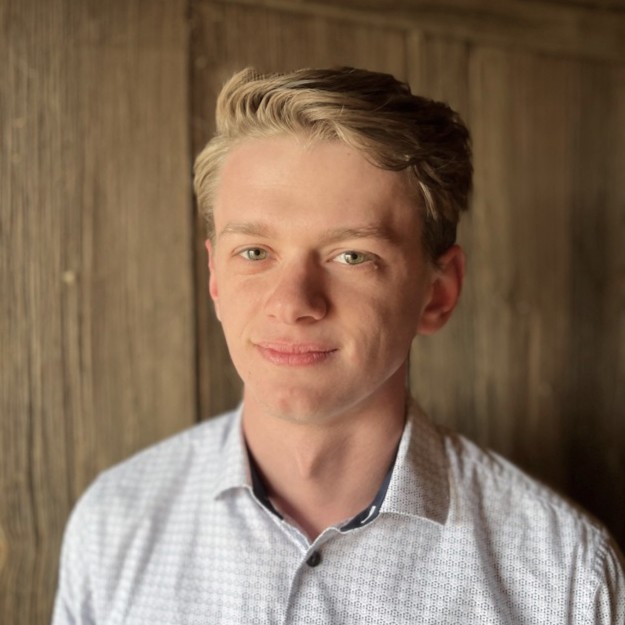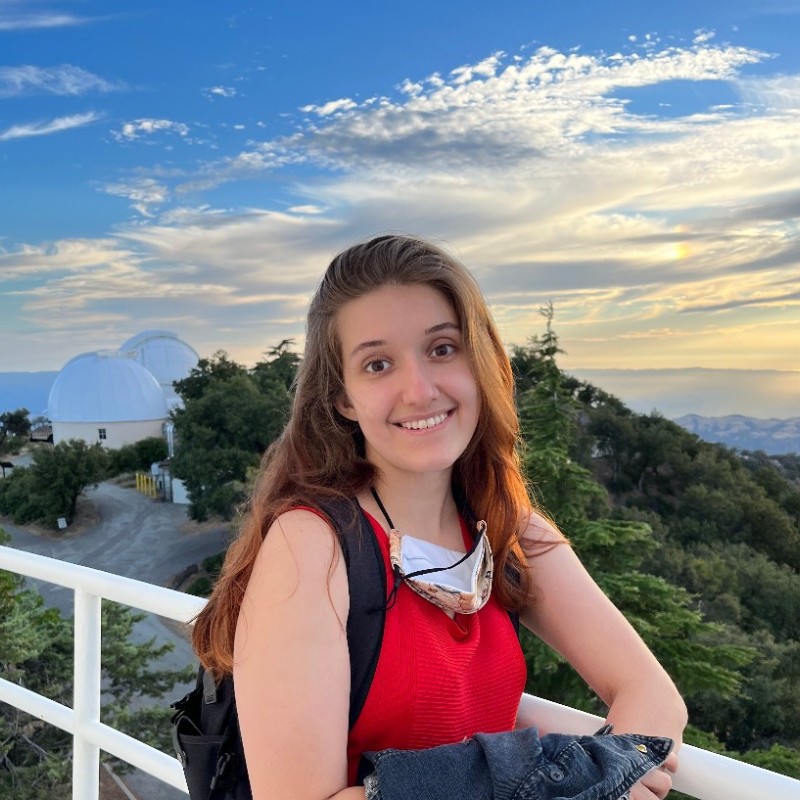Breakthrough Listen Summer Undergraduate Research Internships
Applications for summer 2025 positions are now closed. Please check back in December for information about our summer 2026 program.
“As close to a perfect summer internship as you can get.”
“Had a profound impact on my academic trajectory.”
“The best overall professional experience I've had to date. The quality of the training and mentorship was great. It was the best-organized internship I've had too, and the best social experience I've had in an internship.”
“I would not be where I am, or who I am, today without my experiences working with the Breakthrough Listen team.”
Program Overview
Current undergraduates are invited to apply for research internship positions with the Breakthrough Listen project. Breakthrough Listen is the world's most comprehensive, intensive, and sensitive search for extraterrestrial intelligence. We seek a scientific answer to one of humanity’s oldest questions: Are we alone in the Universe?
Our scientists and engineers are pioneers in the development of software, instrumentation, and science strategy for the search for intelligent life on other worlds. We have access to substantial amounts of time on the planet’s largest telescopes, and connections and collaborations with some of the leading players in the tech industry. We’re also psyched that we get to wake up each day and hunt for aliens.
Summer interns work at the cutting edge of the search. If you are motivated, work well as a member of a team, and can take initiative and responsibility for your own work, you’ll fit in well in our group. Interns have gone on to graduate school at UC Berkeley, Caltech, Columbia, Cambridge, Oxford, and many other prestigious institutions, in addition to careers at Facebook, Google, and other leading companies.

Example Projects
The list of available projects changes from year to year. Students are paired with mentors based on their interests and skillset. If there are particular areas of our research portfolio that interest you (you may want to check out some recent papers or press releases mentioning Breakthrough Listen), we'd like to hear about them in your application. Some example projects from previous years include:
 The Weirdest Stars on the Sky: A Multiband Follow-up - Lana Tilke (Connecticut College)
The Weirdest Stars on the Sky: A Multiband Follow-up - Lana Tilke (Connecticut College)
Lana worked with Dr. Ann Marie Cody to search for indications of engineered megastructures around stars. Applying machine learning techniques to data from NASA's Transiting Exoplanet Survey Satellite, Lana explored a huge set of archival lightcurves to find anomalies which could be technosignature candidates or signs of interesting astrophysics. Lana received a 2022 SETI Forward award in recognition of her research, and is now studying for a PhD in Astrophysics at Arizona State University.
 A Search for ETI around Proxima Centauri - Shane Smith (Hillsdale College)
A Search for ETI around Proxima Centauri - Shane Smith (Hillsdale College)
Shane worked with Dr. Danny Price and Dr. Sofia Sheikh (also one of our former summer interns!) to search for radio technosignatures in data from the Parkes radio telescope. Although he didn't find ET, he did get a first-author article in the prestigious Nature Astronomy journal and coverage in the New York Times, Scientific American, National Geographic, and elsewhere. Shane is now an engineer at the Aerospace Corporation.
 Radio Technosignature Searches of Nearby Galaxies - Carmen Choza (University of Chicago)
Radio Technosignature Searches of Nearby Galaxies - Carmen Choza (University of Chicago)
Carmen worked with Dr. Steve Croft to search for radio technosignatures in a sample of 100 nearby galaxies observed with the Green Bank Telescope. This is one of the major components of the Breakthrough Listen program as announced at the Royal Society in London in 2015. Carmen's first-author paper presenting the analysis of this huge observational dataset was published in the Astronomical Journal, accompanied by a press release. Carmen is now studying for a SETI-related PhD at the University of Oxford.
Other interns have written high performance computing pipelines for the MeerKAT telescope, developed a citizen science platform for technosignature searches in collaboration with Zooniverse at Oxford University, searched for fast radio bursts, looked for laser signals in spectra from the Automated Planet Finder telescope, simulated populations of Doppler drifting signals from the known properties of exoplanetary systems, and much more!
Application Details
For 2025, we are offering internships in the USA, Ireland, UK, and Italy. We are unable to sponsor visas so please carefully read the eligibility criteria below for the country for which you are applying. Women and nonbinary students, underrepresented minorities, transfer students, and others traditionally underrepresented in science are strongly encouraged to apply.
The majority of our projects make heavy use of modern programming languages and tools. While we don’t expect applicants to be experts in all of these areas, familiarity and experience with one or more of Python / Jupyter, version control (e.g. git / github), database software (e.g. MySQL), visualization tools (e.g. Bokeh, D3, etc.), GPU programming, interface design, machine learning, cloud computing, Unix / Linux scripting, and / or public outreach will make for a strong application. Prior astronomy research experience is not a prerequisite, although if you have knowledge or experience of observational astronomy (optical, radio, or other wavebands), signal processing, and / or data reduction we would like to hear about that in your application. We'll also train you up on GNU Radio and you'll have the opportunity to operate some of the planet's most powerful radio telescopes - again, no prior experience is required, but we would like to hear about it if you have any.
If you are eligible for more than one of the international programs (please carefully note citizenship requirements) feel free to complete more than one of the relevant application forms. If you're only eligible for one site, please make sure you fill out the correct form!
If you've thoroughly reviewed the instructions here and still have questions, feel free to email us at reu@berkeley.edu.
Opportunities in the USA (applications now closed for 2025)
Our US program takes place in person at UC Berkeley. Current sophomore, junior, and senior undergraduates (at the time of application) are eligible. The program is open to US citizens, legal permanent residents ("green card" holders), and non-citizens who are already enrolled at degree-granting institutions in the United States (e.g. F1 visa holders, DACA recipients). We cannot sponsor visas for other international students - if you don't already fall into one of the above categories, please don't apply.
Here’s what you’ll need to apply:
- A recent transcript (unofficial is fine)
- A CV
- A letter of recommendation from a faculty member, researcher, or other academic mentor. Please note that only one letter is requested - subsequent letters will be discarded and do not improve your chances of selection.
- A cover letter, which should include details of
- What specifically interests you about SETI, our research, and the program
- Your programming experience (including projects worked on)
- Any prior research experience
- Any other relevant information
By applying, you commit to being available for 40 hours of work per week (June 9 – August 15, 2025). You’ll be expected to work closely with other interns, to consult with our researchers as necessary, and to attend weekly meetings and lectures. The week of June 9 - 13 will consist of an intensive week of preparatory lectures, and the remainder of the summer will consist of independent research. You’ll be expected to keep notes on your progress, to check your code in frequently to github, and to keep in touch with us on our Slack account.
A stipend of $11,478 is provided, which is intended to cover all of your expenses during the program including meals and accommodation. Additionally, travel costs to and from the program site will be reimbursed - instructions regarding booking and reimbursement will be provided to accepted students. Transportation, food, and accommodation will also be provided for field trips to Lick Observatory and to the Allen Telescope Array. Funding is also available to support interns who successfully complete the program to present their work at meetings such as the American Astronomical Society meeting.
To apply (US ONLY):
- STEP ONE: make a single PDF format file containing your cover letter, recent transcript, and CV. The name of this file should be Lastname_Firstname.pdf (e.g. Sagan_Carl.pdf).
- STEP TWO: fill in and submit the form (sign in with Google account required) at https://forms.gle/cgjwC7eNtuFpgAm57, attaching the PDF created in Step One. The form must be submitted no later than February 1, 2025.
- STEP THREE: ask your academic referee to submit their letter of recommendation at https://forms.gle/jTUXAiagZ99yr1Ek7 no later than February 1. They won't receive an email request for this letter from us so it's your responsibility as an applicant to provide these details and ensure they submit their letter before the deadline. We prefer that recommendations are submitted using the above form (sign in with Google account required) but they may also be emailed by your referee to reu@berkeley.edu if necessary.
Opportunities in Ireland and Italy (applications now closed for 2025)
Current undergraduate or masters students who are citizens, permanent residents, or who hold work authorizations in the European Union are invited to apply for positions in Ireland and Italy. If you do not fall into one of the prior categories (e.g. you would need to apply for a visa) you are not eligible to apply. Internships will be between 8 - 12 weeks, to be agreed with the organizers at these sites, during the months of June, July, and / or August.
Ireland: Observational technosignature searches using the Breakthrough Listen backend at I-LOFAR. Research activities will take place in person at the LOFAR Observatory at Birr Castle and/or at the University of Galway (or remotely if agreed beforehand) under the supervision of Prof. Aaron Golden (Galway), in collaboration with the team at Berkeley.
Italy: Observational technosignature searches using the Breakthrough Listen backend on the Sardinia Radio Telescope near Cagliari, Sardinia, Italy. Research activities will take place in person in Cagliari (or remotely if agreed beforehand) under the supervision of Dr. Andrea Melis, Dr. Maura Pilia, and the team at SRT.
Here’s what you’ll need to apply:
- A recent transcript (unofficial is fine)
- A CV
- A letter of recommendation from a faculty member, researcher, or other academic mentor. Please note that only one letter is requested - subsequent letters will be discarded and do not improve your chances of selection.
- A cover letter, which should include details of
- What specifically interests you about SETI, our research, and the program
- Your programming experience (including projects worked on)
- Any prior research experience
- Any other relevant information
Students will participate remotely in team meetings with the Berkeley interns when timezone differences permit. A stipend of 650 EUR per week will be provided, which is intended to cover all of your expenses during the program including meals and accommodation. Additionally, travel costs to and from the program site will be reimbursed - instructions regarding booking and reimbursement will be provided to accepted students.
To apply (EUROPE ONLY - US STUDENTS PLEASE SEE DETAILS UNDER "OPPORTUNITIES IN THE USA" ABOVE):
- STEP ONE: make a single PDF format file containing your cover letter, recent transcript, and CV. The name of this file should be Lastname_Firstname.pdf (e.g. Sagan_Carl.pdf).
- STEP TWO: fill in and submit the form at https://forms.gle/5fSmwZjmdz8g4itS6, attaching the PDF created in Step One. Here you can express an interest in positions in Ireland, Italy, or both. The form must be submitted no later than February 1, 2025.
- STEP THREE: ask your academic referee to submit their letter of recommendation at https://forms.gle/jTUXAiagZ99yr1Ek7 no later than February 1. They won't receive an email request for this letter from us so it's your responsibility as an applicant to provide these details and ensure they submit their letter before the deadline. We prefer that recommendations are submitted using the above form (sign in with Google account required) but they may also be emailed by your referee to reu@berkeley.edu if necessary.
Opportunities in Oxford (applications now closed for 2025)
Current undergraduate or masters students who are citizens, permanent residents, or who hold work authorizations in the United Kingdom are invited to apply for positions at the Breakthrough Listen international headquarters at the University of Oxford. These positions will be for 8 weeks in July and August. In addition to the positions funded by Breakthrough Listen, other projects are available as part of the overall program managed by the Astrophysics Sub-Department. More details, including application instructions, and links to the forms to apply for the program in Oxford, can be found here. Applications close on March 12.
Opportunities in France (applications now closed for 2025)
Current EU masters students (M1 and M2) who are interested in a research position with Dr. Cherry Ng-Guiheneuf at CNRS Orleans are invited to contact her directly at cherry.ng-guiheneuf@cnrs-orleans.fr. Details are posted on the French national student portal. Positions are available as soon as March 2025, for up to five months.
Breakthrough Listen summer internships are sponsored by the National Science Foundation under the Berkeley SETI Research Center REU Site Grant No. 2244242, and by Breakthrough Listen, which is managed by the Breakthrough Initiatives, sponsored by the Breakthrough Prize Foundation.